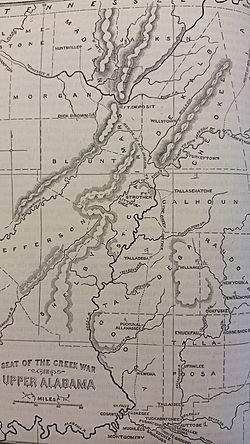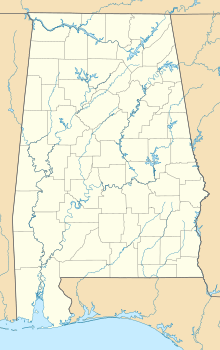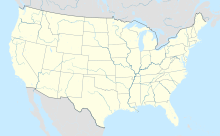Fort Armstrong (Alabama) facts for kids
Quick facts for kids Fort Armstrong |
|
|---|---|
| Cedar Bluff, Alabama in United States | |

Map of Alabama during the War of 1812. Fort Armstrong is located on the upper right portion.
|
|
| Coordinates | 34°12′00″N 85°35′29″W / 34.20000°N 85.59139°W |
| Type | Stockade fort |
| Site information | |
| Owner | Private |
| Controlled by | Private |
| Open to the public |
no |
| Condition | Inundated by Weiss Lake |
| Site history | |
| Built | October 1813 |
| Built by | Tennessee militia |
| In use | 1813-1814 |
| Battles/wars | Creek War |
Fort Armstrong was an old fort made of tall wooden walls (called a stockade fort). It was built in what is now Cherokee County, Alabama during a conflict called the Creek War. Its main jobs were to keep people safe from a group of Native American warriors known as the Red Sticks, and to act as a place where soldiers could gather and get supplies for battles.
Contents
Why Fort Armstrong Was Built
During the War of 1812, some members of the Creek tribe had a civil war. One group, called the White Sticks, wanted peace. Another group, called the Red Sticks, were more hostile. The United States worried that the Red Sticks might join forces with Great Britain.
After some attacks on settlers, like the Battle of Burnt Corn and the Fort Mims massacre, the U.S. started building many forts. These forts were built in the Mississippi Territory (which included parts of present-day Alabama). Their purpose was to protect settlers and to help supply soldiers fighting the Red Sticks.
The Story of Fort Armstrong
Building the Fort in 1813
Fort Armstrong was built in October 1813. Soldiers working for General James White constructed it. General White was part of General John Alexander Cocke's army. The fort was named after John Armstrong Jr., who was the Secretary of War at that time.
The fort was built to protect the local Cherokee people from Red Stick attacks. It was also a place to prepare for future battles against the Red Sticks. Boats were put together at Fort Armstrong to carry supplies down the Coosa River. Wagons brought supplies to Fort Armstrong from Fort Ross.
Key Events During the Creek War
Before the Battle of Talladega, General Andrew Jackson told General White and his soldiers to go guard Fort Strother. White set out with about 1,000 soldiers, including mounted infantry and Cherokee fighters like Sequoyah.
However, General Cocke told White to return to Fort Armstrong because Fort Strother didn't have enough supplies. On their way back to Fort Armstrong, White's troops attacked the Hillabee towns. They didn't know that the Hillabee people had already made peace with General Jackson.
Cherokee soldiers who were part of Jackson's forces stayed at Fort Armstrong. They were allowed to go on small raids against the Red Sticks. Even after the Battle of Talladega, many Cherokee soldiers remained at Fort Armstrong. They helped guard supply routes and communication lines. Some also guarded Pathkiller at his home in Turkeytown. The Cherokee who stayed at Fort Armstrong built a council house there.
In March 1814, Colonel Gideon Morgan gave orders for the remaining Cherokee forces to meet at Fort Armstrong. From there, they were to march to Fort Strother. At the same time, Colonel John Williams moved supplies from Fort Armstrong to Fort Williams. This helped General Jackson's forces get ready for the important Battle of Horseshoe Bend.
After the War
Once Fort Armstrong was no longer needed for military use, it was left empty. A ferry then started operating at the site.
Later, John Ross (who later became a famous Cherokee chief) and his brother Andrew ran a store at the old fort site.
Where is Fort Armstrong Today?
The exact spot where Fort Armstrong stood is not known today. Researchers from Jacksonville State University have looked for it on Pruett's Island. It's possible that the original site is now underwater because of Weiss Lake.
Location of the Fort
Historians have had different ideas about where Fort Armstrong was located. Thomas M. Owen thought it was on the Etowah River. Albert J. Pickett believed it was on Coosahatchie Creek. However, most evidence suggests it was on the north bank of the Coosa River. This is near Turkeytown and what is now Cedar Bluff, Alabama.
 | William Lucy |
 | Charles Hayes |
 | Cleveland Robinson |



